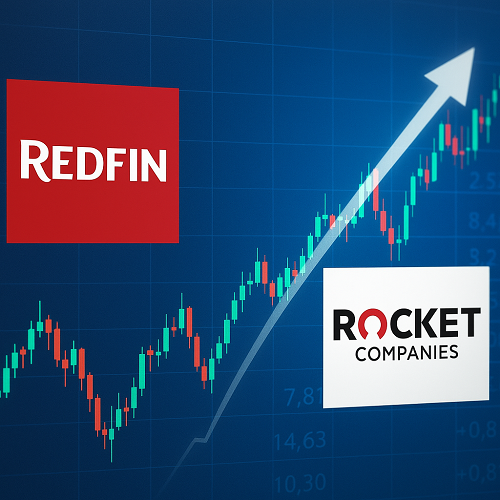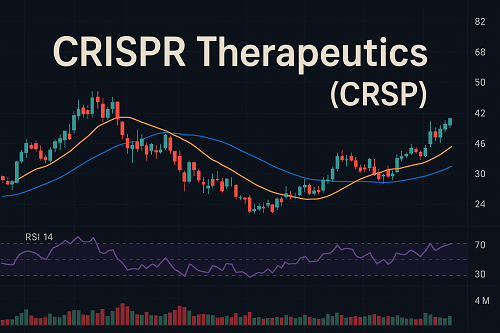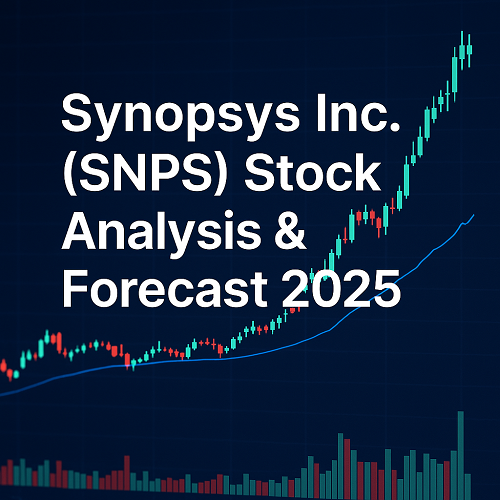Redfin Corporation (NASDAQ: RDFN) is one of the most closely watched proptech and digital brokerage firms in the U.S. housing sector. In 2025, the company entered a transformative phase following Rocket Companies’ all-stock acquisition valued at $1.75 billion, signaling a convergence between real-estate services and digital mortgage finance.
This comprehensive review evaluates Redfin’s current position within the market, its business fundamentals, valuation metrics, and the broader economic context influencing its outlook. The analysis adopts a neutral tone, weighing both the upside potential and the inherent risks of the company’s evolving model.
Company Overview and Business Model
Founded in 2004 in Seattle, Washington, Redfin pioneered the idea of a tech-driven real-estate brokerage that combines online property search, agent services, and end-to-end transaction management.
Core Segments
- Brokerage Services – Primary revenue driver through commissions on home sales. Redfin agents operate under a salaried model rather than independent commissions, designed to reduce costs and standardize service.
- Redfin Mortgage and Title – Ancillary services providing financing and settlement, creating vertical integration.
- Redfin Now and Concierge Services – Offer instant-buy and home-preparation services, though exposure to housing cycles has caused recent retrenchment.
- Technology and Data Platform – Comprehensive property data powering listings, pricing analytics, and customer UX.
Business Model Highlights
- Lower-fee brokerage structure appeals to cost-sensitive buyers/sellers.
- Revenue diversification through mortgage and title provides cross-sell opportunities.
- Scalability challenges persist due to thin brokerage margins and cyclical transaction volumes.
Redfin’s long-term ambition has been to build an integrated real-estate ecosystem that streamlines buying, financing, and closing under one digital umbrella.
The Rocket Companies Acquisition (2025)
In mid-2025, Rocket Companies (NYSE: RKT) announced a definitive agreement to acquire Redfin in an all-stock transaction valued at approximately $1.75 billion. The merger aims to create the largest end-to-end home-buying ecosystem in North America.
Strategic Rationale
- Cross-integration of mortgage & brokerage: Combining Rocket’s dominant mortgage origination with Redfin’s brokerage platform creates a full-stack home-transaction pipeline.
- Cost synergies: Expected savings in marketing, technology infrastructure, and customer acquisition costs.
- Data leverage: Rocket’s borrower data and Redfin’s housing data together form one of the most comprehensive consumer real-estate datasets in the U.S.
- Consumer journey control: The merged entity aims to own the home-buying experience from pre-approval through closing.
Market Implications
The acquisition positions Rocket + Redfin as a credible rival to Zillow Group and Realtor.com. Analysts view this as a defensive consolidation in a sluggish housing market but also as a potential catalyst for long-term growth once interest rates stabilize.
Macroeconomic Backdrop and Housing Market Trends
The U.S. housing market in 2025 continues to navigate the aftershocks of elevated mortgage rates and affordability constraints.
- Mortgage rates remain above 6%, reducing transaction volumes.
- Inventory levels have improved slightly, yet remain historically low.
- Home prices are largely stable year-over-year (+1–2%), but regional disparities persist.
- Consumer sentiment has improved modestly as inflation eases.
Impact on Redfin
Redfin’s business is transaction-volume sensitive; fewer listings and longer closing cycles compress revenues. However, stabilization of rates in late 2025 is expected to slowly revive market activity.
Should 2026 see rates fall below 6%, brokerage and mortgage activity may normalize, supporting Redfin’s path toward profitability within the Rocket ecosystem.
Financial Performance Overview
Revenue and Growth
- TTM Revenue: ≈ US $1.04 billion
- Y/Y Growth: –2 % (2024 vs 2023)
- 5-Year CAGR: ≈ 4 %, reflecting volatile housing cycles.
Profitability Metrics
- Gross Margin: ~ 35 %
- Operating Margin: –14 %
- Net Margin: –18 %
- Adjusted EBITDA (2025 Q1): –US $31.9 million (improved Y/Y).
Balance Sheet & Liquidity
- Current Ratio: 1.16 ×
- Quick Ratio: 0.61 ×
- Debt/Equity: ≈ 0.9 × (post-Rocket deal expected to improve).
- Altman Z-Score: –0.3 (high distress risk pre-merger).
Shareholder Perspective
Dilution has been a recurring concern, with shares outstanding up ~7.5 % Y/Y. The Rocket deal, though all-stock, may ultimately support shareholder value via scale economies if synergies materialize.
Competitive Landscape and Industry Positioning
| Company | Core Focus | Differentiator | Revenue (approx.) | Profitability |
|---|---|---|---|---|
| Zillow Group | Listings, ads, lead gen | Dominant traffic and brand | $2.0 B | Profitable |
| Redfin (Rocket) | Brokerage + mortgage | Integrated transaction platform | $1.0 B | Negative |
| Opendoor | iBuyer model | Instant home offers | $5.5 B | Negative |
| eXp World Holdings | Agent network | Cloud-based brokerage | $4.4 B | Positive |
Competitive Advantages
- Integration with Rocket strengthens financing capabilities.
- Salaried agent model enhances consistency and customer trust.
- Brand equity in digital brokerage remains strong.
Challenges
- Lower search traffic versus Zillow.
- Persistent losses limit capital flexibility.
- Cyclical revenue pattern linked to macro rates.
Valuation Analysis
As of October 2025:
- Price/Sales (P/S): ~1.3 ×
- EV/Sales: ~2.2 ×
- Forward P/E: N/A (negative earnings).
- Analyst Consensus Target: ≈ US $10.85 (current price ~ US $11.20).
Valuation Interpretation
Redfin appears fairly valued given its risk profile. The stock is not “cheap” by traditional metrics because of negative earnings, yet its price/sales ratio is reasonable for a tech-enabled brokerage with growth potential.
Should the Rocket integration yield synergies and margins turn positive by 2027, a re-rating toward EV/Sales ≈ 3 × is plausible — implying potential upside of 20-30 %. However, if housing volumes remain flat, downside toward $8 is also feasible.
Investment Thesis
Bull Case
- Rocket acquisition delivers cost synergies and cross-sell opportunities.
- Housing market recovers as rates decline toward 5 %.
- Margins improve from –14 % to +5 % by 2027.
- Strong brand and tech platform drive market-share expansion.
Bear Case
- Housing transactions remain depressed beyond 2026.
- Integration costs exceed synergies.
- Cash-flow negativity forces further dilution.
- Competitors (Zillow, eXp) retain dominant market positions.
Base Case View
Neutral. Redfin is transitioning from a pure brokerage to a multi-channel real-estate ecosystem. Short-term earnings pressure is likely to persist through 2026, but the Rocket deal creates a path to scale and profitability if integration is executed successfully.
Risk Assessment
| Risk Factor | Impact | Commentary |
|---|---|---|
| Housing market volatility | High | Direct correlation to transaction volume and commission revenue. |
| Integration execution | High | Post-merger alignment of systems and workforce is complex. |
| Competitive pressure | Medium | Zillow’s dominance may limit Redfin’s traffic growth. |
| Regulatory environment | Medium | State brokerage laws and mortgage regulation pose compliance burdens. |
| Liquidity & dilution | Medium | Potential share issuance to fund growth or cover losses. |
Technical and Trading Outlook
- Current Price: ≈ US $11.19
- 52-Week Range: US $5.59 – US $15.29
- Beta: ~ 2.3 (high volatility)
- Volume: ≈ 29.7 M shares (average daily).
Technical Levels
- Resistance near $12.50 (Rocket deal value).
- Support zone around $9.00.
- Breakout above $13 could indicate renewed momentum; below $9 signals further weakness.
Trading Strategy (Neutral View)
Swing traders may find risk/reward appealing on pullbacks toward $9 with targets of $13–14. Long-term investors should await clearer margin improvement before accumulating shares.
Outlook 2025–2027
Base Scenario (60 % Probability)
- Housing market recovers moderately in 2026.
- Revenue growth of 6-8 % CAGR.
- Operating margin approaches breakeven by 2027.
- Stock trades in the $10–13 range.
Bull Scenario (25 %)
- Interest rates decline rapidly to < 5 %.
- Strong synergy realization post-merger.
- Operating margin > 7 %; EPS positive by 2027.
- Valuation re-rating toward $18–20 per share.
Bear Scenario (15 %)
- Prolonged housing slump; integration challenges.
- Continued cash-flow losses.
- Stock trades in $6–8 range with limited investor confidence.
Analyst Consensus and Market Sentiment
- Consensus Rating: Hold (majority of covering analysts).
- Price Target Range: $8 to $14 per share.
- Institutional Ownership: ≈ 65 %.
- Short Interest: ~ 10 % of float, indicating ongoing skepticism.
Analysts cite improving cost discipline and the Rocket synergies as medium-term positives, but remain cautious on valuation until sustained profitability is achieved.
Conclusion
Redfin’s strategic acquisition by Rocket Companies marks a pivotal moment in the digital real-estate industry. The combined entity has the potential to redefine how Americans buy and finance homes by integrating brokerage, mortgage, and closing services into a seamless digital journey.
However, for investors, the path forward is balanced by execution risk, a still-fragile housing market, and a history of unprofitable operations. The risk/reward profile remains neutral for now, with asymmetric potential toward either direction depending on macroeconomic trends and merger execution.
Bottom Line: Redfin is a speculative play within a transforming industry. Patience, discipline, and careful monitoring of synergies and margins will be essential for any position in RDFN.





 XAUT-USD
XAUT-USD AMD
AMD MARA
MARA SHOP
SHOP BULL
BULL CL=F
CL=F